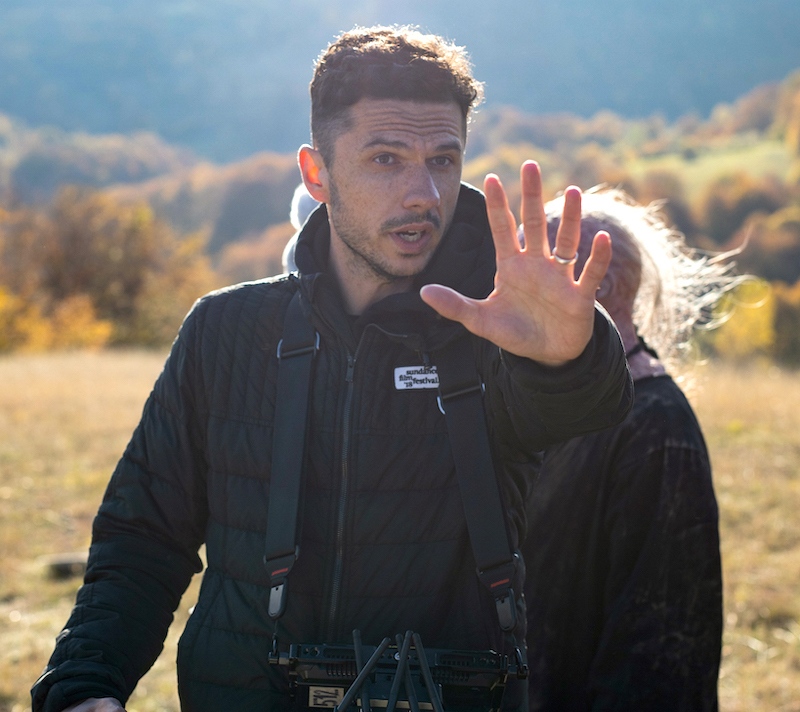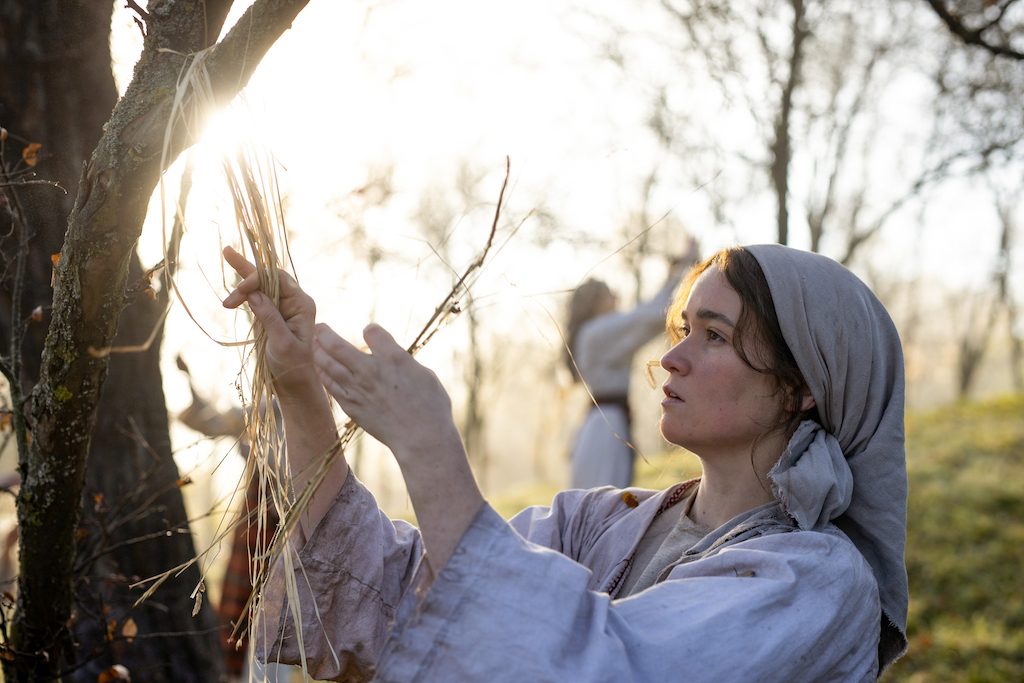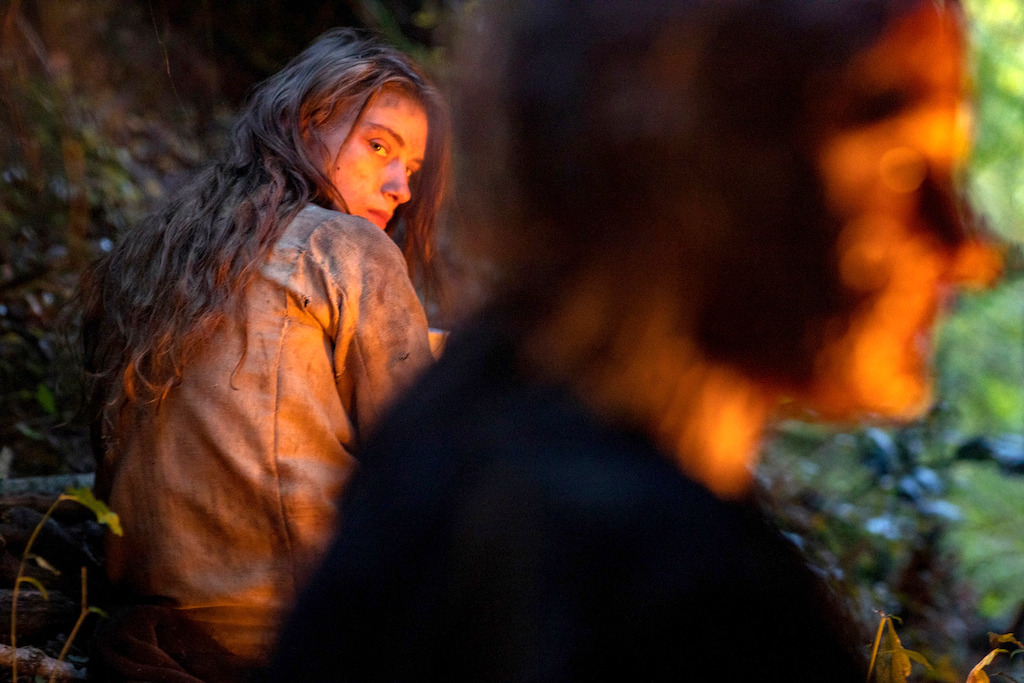You Won’t Be Alone may be his feature film debut, but Australian writer and director Goran Stolevski is no newcomer to the industry. He has spent much of the past 15 years in the festival circuit, receiving critical acclaim for his many short films, including Would You Look at Her (Sundance 2018’s winner in the “Best International Short” category). Over the years, his work has been seen at over 200 festivals… and his ability to develop characters and evoke emotion in a condensed amount of time did not go unnoticed.
Enter Kristina Ceyton and Samantha Jennings of Sydney’s Causeway Films. After reviewing a number of Stolevski’s screenplays, they knew his was a voice that needed to be heard on a larger scale. And the vehicle to do that with was You Won’t Be Alone.
Written and directed by Stolevski, the story is set in his birthplace of Macedonia in the 1800s, and follows a young girl Nevena (Sara Klimoska) in a mountain village who is kidnapped and transformed into a witch by an ancient spirit named Maria. Lacking any kind of socialization or language ability, she is eventually abandoned by her captor and thrust into the local community who has no idea who or what she is. Accidentally killing a peasant woman, she discovers that she is able to assume the shape of the creatures she kills – and she uses this ability to experience life on several different levels, all the while learning about humanity and desperately seeking its acceptance.

Goran Stolevski. Photo by Branko Starcevic / Focus Features
You Won’t Be Alone is a raw, Mary Shelley-esque blend of folktale and horror that showcases Stolevski’s ability to layer characters and communicate with minimal dialogue. Over the course of the film, Nevena assumes numerous forms and our only verbal insight into her evolving mind is via a voice-over of simple words strung together. I spoke with Stolevski about his writing process, how he created this story and the close relationships he has with both his characters and those tasked with bringing them to life.
You’ve done a lot of shorts in the past – how did you find the transition to full length feature film and how did you adapt your writing process?
I was actually writing features all through. The first one was fifteen years ago and I had already made about 10 shorts by that point. I think it was a matter of looking at something else that was unachievable. If I were to set out to write a novel, that would seem impossible – but in comparison, I thought “oh, a movie I can do!” I tried to look at it holistically as the shape of this overall story and divided it into certain parts – and then determined which feeling landed in which section, so that it felt like a build all the way through.
This was, I think, the sixth feature I’d written, and now I’ve written thirteen. It’s sort of become second nature. The last one I wrote was during the first wave of COVID two years ago – it only took a week to finish the first draft! I feel like you have to become this sort of “story-generating machine”; things become innate and it’s a very instinctive process. I don’t really think about it in a cerebral way a lot of the time anymore.
When I was writing You Won’t Be Alone I came up with the story very quickly because I had to meet a deadline for a particular story workshop. Once I had the story, I had a sense of where the turning points were. Often it’s not even about plot, it’s just where the feeling shifts to a higher register and I had that divided in my head. Different parts of my chest are connected to different parts of the story! “This belongs here and this belongs here” and so on and so forth.
Tell me about your research for this story, particularly in terms of the folklore, and how you decided which texts to draw from.
Honestly, I didn’t have to be too selective – there’s not a lot of Macedonian anything from the 19th century!
I was living in England at the time, for my husband’s job. What was mind-blowing was The British Library had these Macedonian published texts that I’m not even sure exist in Macedonia anymore! I read all the books I could find. I was concentrating on a specific region where the story is set; there was a Polish anthropologist who went to this region in the late 1920s/early 1930s and found these villages. They barely had evolved in centuries and there were photographs of them as well. That was a bit of a way in too.
This was a way of life that existed, not just in the region, but all across most of Europe and most of the world, really. That agrarian, cyclical, birth/death/rebirth… sowing the fields, reaping them and so on. So it was a matter of tapping into a little bit of that and thinking about what kind of mindset that would give me if I were living in that time. And also the specific rituals in terms of the day-to-day things that they would be doing.
Again – what kind of brain creates this ritual? Where could this come from?
My approach to even the film itself was to imagine if a folktale or fairy tale was based on a true story. I was trying to film what that true story looked and felt like. It was trying to decode things that eventually become myth – what was the kernel of basic, mundane reality that led to that?
“Horror” has become something of a broad term – I found your story to be a bit more in line with, say, Frankenstein, where it has elements of horror but is ultimately about humanity. How do you go about evoking a sense of empathy in this genre, especially when it comes to your so-called villains?
Originally, when I first wrote the synopsis, the backstory for Maria (Anamaria Marinca) (who is technically meant to be the villain) was actually the opening sequence. To me there was always empathy – the two main characters are basically my brain split in half. Maria and Nevena are essentially me and I could connect very intensely to parts of both of them. I think I have a relationship to each of them that is based on empathy – that’s what’s important to me. And then I try to capture that in the details that exist on the screen as much as those that are in my head and on the page.
Even when they’re not the so-called villains, I’m less worried about my characters being likable or liked so much as detailed and understood. And interesting, I suppose! I remember even in my early writing, a lot of the characters I would write were seen as unlikable. I was always surprised by that, or even that it was a criteria – and then I realized that “unlikable woman” was what describes my personality! I felt a lot of empathy for Maria and I understood why that character became who she was. What makes a person still hold on to her desire for connection and what makes another person just give it up after trying and trying and trying? I think both of those feelings have validity and I don’t think they’re wrong. That’s where I came from and I hope the audience connected with them. I try to give full emotional availability for whoever is willing to make that reach but I don’t want to force anyone to either.
You had a very unique challenge when it came to character development – you’re writing a number of characters, all inhabited by a central one. Tell me about that process and what it was like to see Nevena and her various personas transition from page to screen.
It was actually fascinating. To me, it is the one soul all the way through. But I pictured her differently at every stage, every iteration, even when I was writing it. Everyone who read the screenplay would keep forgetting that they were different personalities. And then they would realize “Oh right, of course, she’s a man when that’s happening”. I kept forgetting that people didn’t remember that! So it was a matter of maintaining that connection.

Biliana (Alice Englert). Photo by Branko Starcevic/ Focus Features
The other thing is – and I realized I have been doing this unconsciously for years – as soon as I’m on set, I put myself in their emotional state, to an extent. In their mindset. And I think part of that can translate organically without even talking about it. So I was always there and the actors were always connected to me. I’m very close with all of my actors. I think a little bit of that would translate in terms of the emotional true line.
Also, the voice-over was recorded in advance so they had all heard it. Sara Klimoska, who plays the first major iteration of the character, was with me for several weeks before the production as well so we developed a set of characteristics and mannerisms and a world setting together. She would then meet every individual actor that came along and guide them through everything that she had done. They would hear the voice-over, I would take them to the village so they could see the world and there was a reference video with a real-life person that we were using as well, for some of the mannerisms and to help in unlocking this consciousness. And then the actors would just bring their own soul into it. Because the character is designed to evolve through every particular life and body and iteration. If there was any aspect we could take and bring into the next iteration, I would try and find a way to do that (within the limits of logistics and scheduling, obviously). It kind of became almost a happy accident that it worked out that way. There’s a lot of planning that went into it but there’s not much that you can control, you’re just hoping for the best. I think it literally is – for me, at least – making sure that I’m as connected to the character, and to the actor, as intensely as I could be at all times. That made a big difference.
What role does language – or the lack of it – play in the story?
A lot of the individual lines of the voice-over came to me before most of the rest of the film and that shaped the consciousness and the story around it, to an extent. I was trying to do something with stream of consciousness, using simple words but then translating that simplicity essentially… and then building the character around it. There’s that idea that if a person isn’t exposed to other people or speaking before the age of thirteen, that part of the brain shuts down, or stays frozen from age thirteen onwards, so they can’t develop the ability to speak.
But even if they’ve grown up away from humanity, there are bits of language that they can grasp. So I was using that as a sort of context when I was writing the voice-over. I felt that to an extent, even as she evolves and even as her language does evolve a little bit, it will always be frozen at a certain point because she’s shaped by what her childhood was. Through its simplicity, and because she has such an off-kilter perspective, I felt like it gave me a different way of looking at humans. It’s like what you were saying about Frankenstein – I wanted this story to be about humanity. By taking someone outside of it, and then throwing them in the middle… they then look at humanity as if it’s the strange thing, rather than they are the strange thing themselves. I often feel like I’m the strange person in general… but then I think some of our behaviors genuinely don’t make sense!
I read a review that said a film like this is much more reminiscent of a director’s masterpiece rather than a debut. Why was it important for this story to be your first feature and where do you see yourself going from here?
To be honest, that’s not something I had control over. I didn’t think this film would ever get made! Even when I was writing it – I was genuinely dealing with the fact that I had been unemployed for three years and had nothing to do with my days. I was in a strange place where I knew nobody. So to fill my time I thought I would write something and maybe it would get made… and while writing it I thought “this will never get made”. So I was very surprised!
But every time I write something, I feel like I’m doing it more with my body now than with my brain. Even directing – I would describe everything that way. I’m very glad it was my first film, because there’s so much of me in it. In an abstract, not direct sense – I never want to be very autobiographical. But there’s a hidden love letter to my husband in there that only he and me will know about, so there are a lot of things that come from my soul. So I thought “if I only ever get to make one movie and then I die and this is it, that’s fine”. I feel the same way about my second film (Of an Age, release date TBA); I’ve done all I need to do. I’m amazed I got to make one film, much less two.
And in terms of where I’m going to go now? The producer I’m working with – every time she gets a new script, she says “this has nothing to do with the last ten…it’s completely different!” And I say “I know, I don’t have an explanation!” The second one – which is in sound mixing right now – is a grungy, gay love story set in suburban Melbourne in the 1990s. So it’s very different! But I think again it’s about outsiders connecting, so there are some commonalities. I don’t know where the stories come from but I get morbidly attached to them and have to bring them to life. It’s almost like they’re guiding me and I have no control over it after awhile.

